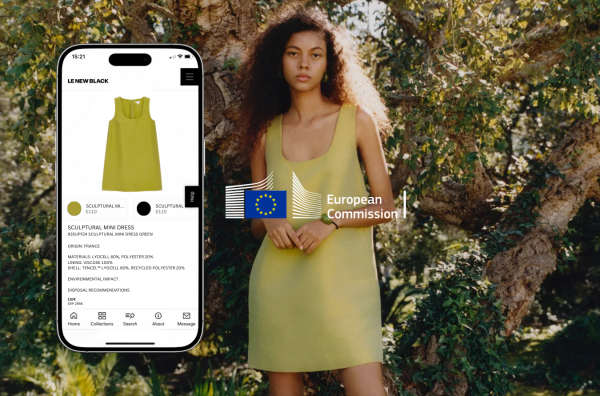01/05/2025
Industry
Change is coming for fashion brands and retailers selling into the European Union. The upcoming introduction of the EU Digital Product Passport (DPP)—a cornerstone of the Ecodesign for Sustainable Products Regulation (ESPR)—marks a significant shift in how product information is documented, shared, and understood across the value chain. For many, it will be a wake-up call. For those who prepare, it’s a real opportunity to lead with transparency, innovation, and compliance in a rapidly evolving marketplace.
Let’s unpack what it means—and how fashion brands can be ready.
What Is the EU Digital Product Passport?
Imagine every garment, shoe or accessory carrying a digital profile—a kind of product “CV”—containing standardised, critical information about its origins, composition and environmental impact. That’s the essence of the Digital Product Passport. Designed to travel with a product from design through to disposal, this digital record will be accessible to everyone with a stake in its journey: consumers looking to make informed, ethical choices; retailers under pressure to back up sustainability claims; regulators demanding clear, auditable data; and supply chain partners who rely on traceability to meet their own standards.
For the fashion sector, the DPP is expected to cover:
-
Material breakdown and sourcing
-
Repairability and recyclability
-
Environmental impact data
-
Traceability to origin
-
Compliance with relevant sustainability standards
This isn’t just a compliance tool—it’s a key part of the EU’s broader strategy to combat greenwashing, promote circularity, and ensure that sustainable design becomes the default, not the exception.
Why does it matter for fashion brands and retailers?
Fashion brands and retailers play a crucial role in the supply chain, connecting manufacturers with consumers. Positioned at the heart of the Digital Product Passport (DPP) framework, these businesses are key players in driving data transparency across the industry. With the DPP, accurate, traceable product information must flow seamlessly throughout the supply chain. This change will impact several areas of operations, including:
-
Sourcing – Reliable sustainability data from upstream partners will be essential.
-
Sales – Retailers will expect accurate, traceable product information that meets both regulatory and consumer standards.
-
Systems – There will be a need to support digital IDs, such as QR codes or NFCs, that link to DPP data.
For businesses selling in the EU, compliance with these new regulations will be necessary. Embracing data transparency now presents an opportunity to strengthen positions in the evolving fashion industry, ensuring a competitive edge while meeting regulatory requirements.
Timeline and Scope
While the exact timeline is still being finalised, the EU has indicated that the Digital Product Passport will begin applying to priority sectors as early as 2027, with apparel and textiles high on the list. The DPP is part of the broader Ecodesign for Sustainable Products Regulation, which is already in motion. Product-specific rules are being developed, and once in place, compliance will be mandatory.
Fashion businesses should expect DPP requirements to be:
-
Mandatory for certain product categories, including clothing, footwear, and accessories.
-
Legally enforced at both import and retail levels, regardless of the country of origin.
-
Standardised across all EU member states, ensuring consistency and interoperability.
In essence, these changes are approaching, and the shift is not temporary—it represents a fundamental transformation in how products will be managed and marketed in the European market going forward.
How Can LE NEW BLACK Help?
As the Digital Product Passport (DPP) becomes integral to the fashion industry's transparency and sustainability efforts, fashion brands need efficient ways to share detailed product information with their retail partners.To this end, LE NEW BLACK offers a suite of tools designed to facilitate the transmission of information between brands and their buyers, including:
-
Customisable B2B Showrooms – LE NEW BLACK provides brands with customisable online showrooms, enabling them to present their collections professionally. These showrooms can include comprehensive product details, aligning with DPP requirements for transparency.
-
Digital Line Sheets and Lookbooks – Brands can create digital line sheets and lookbooks that encompass essential product information, such as material composition and sourcing details—critical components of the DPP.
-
Real-Time Inventory Management – The platform's inventory control features allow brands to manage and update product availability in real-time, ensuring that retailers have access to the most current product information—key to maintaining accurate DPP data.
-
Integrated Communication Tools – LE NEW BLACK includes messaging portals and retailer directories, facilitating direct communication between brands and retailers. This ensures that any updates or changes to product information are promptly shared, preserving the integrity of DPP data across the supply chain.
By utilising these features, fashion brands can efficiently manage and disseminate the detailed product information required by the DPP, strengthening their partnerships with retailers and enhancing compliance with emerging industry regulations.
What Should Fashion Brands and Retailers Do Now?
To prepare for the Digital Product Passport (DPP), fashion brands and retailers can take the following practical steps:
-
Map the Supply Chain – Identify key data sources and spot any gaps that may hinder compliance.
-
Start Gathering Information – Focus on collecting data related to material composition, environmental impact, and sourcing transparency from suppliers.
-
Assess Digital Infrastructure – Evaluate current systems for product-level traceability and data sharing, and plan for necessary upgrades.
-
Engage with Tech Providers – Explore whether current tech providers are planning for DPP integration or identify platforms already prepared for DPP compliance.
-
Monitor Policy Developments – Designate someone to stay updated on evolving regulations and ensure ongoing compliance with the latest requirements.
Shaping the Future of Fashion
The Digital Product Passport is more than a regulatory shift; it offers an exciting opportunity for the fashion industry to embrace greater transparency and sustainability. It signals a move toward a future where businesses can proudly showcase not only what they make, but also how and why they make it.
For fashion brands and retailers, the path forward is clear: embrace the opportunity to lead with transparency and foresight. Those that take proactive steps now will be best positioned to thrive in the next chapter of fashion’s evolution.
The change is coming. The question is—how ready is the industry to turn the page?



